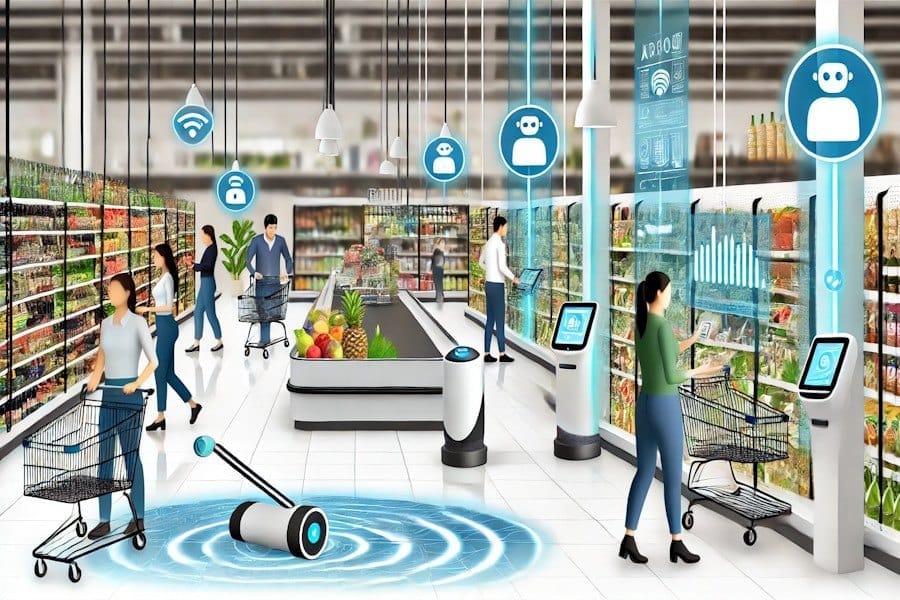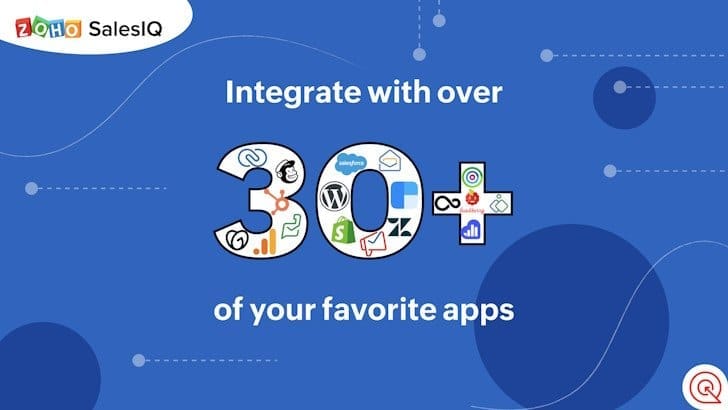The Integration of AI in Supermarkets: Transformations and Implications

Publish Date: Last Updated: 10th February 2025
Author: nick smith- With the help of CHATGPT
Artificial Intelligence (AI) is revolutionizing the retail landscape, with supermarkets at the forefront of this transformation. By adopting AI technologies, these retailers aim to enhance operational efficiency, personalize customer experiences, and streamline supply chains. This article explores how leading supermarkets are implementing AI, the benefits and challenges of these innovations, and their impact on both shoppers and businesses.
Supermarkets Embracing AI
Several prominent supermarket chains have integrated AI into their operations:
-
Tesco: The UK's largest retailer plans to expand its use of AI to personalize shopping experiences, utilizing data from its Clubcard loyalty program to offer tailored suggestions and insights. Financial Times
-
Sainsbury's: Through a partnership with Microsoft, Sainsbury's is leveraging AI to provide real-time data and operational insights, including the use of shelf-edge cameras to guide efficient restocking. The Wall Street Journal
-
Woolworths: The Australian supermarket chain acquired tech assets from the bankrupt US company Takeoff Technologies to operate its micro-fulfillment centers, which use robots and automated systems to enhance order processing efficiency. The Australian
-
Sam's Club: Owned by Walmart, Sam's Club has eliminated traditional checkouts at a new location, implementing AI technology that automatically verifies receipts, enabling faster exits. The Sun
Applications of AI in Supermarkets
Supermarkets are deploying AI across various facets of their operations:
-
Personalized Shopping Experiences: By analyzing customer data, AI enables retailers to offer personalized product recommendations and promotions, enhancing customer engagement.
-
Inventory Management: AI-powered systems predict demand and optimize stock levels, reducing waste and ensuring product availability. Oracle
-
Automated Checkout: AI facilitates cashierless checkout systems, allowing customers to shop and pay without traditional checkouts, thereby reducing wait times.
-
Supply Chain Optimization: AI analyzes data to streamline logistics, improving delivery times and reducing costs. Oracle
Impact on Shoppers and Businesses
The integration of AI in supermarkets presents both advantages and challenges:
Positive Impacts
-
Enhanced Customer Experience: Personalized recommendations and efficient checkouts contribute to a more convenient shopping experience.
-
Operational Efficiency: AI optimizes inventory and supply chains, leading to cost savings that can be passed on to consumers.
-
Reduced Waste: Accurate demand forecasting minimizes overstocking, contributing to sustainability efforts.
Negative Impacts
-
Privacy Concerns: The extensive use of customer data raises issues regarding privacy and data security.
-
Job Displacement: Automation may lead to reduced demand for certain roles, impacting employment.
-
Technological Dependence: Over-reliance on AI systems could pose risks if technical failures occur.
Conclusion
AI is reshaping the supermarket industry, offering significant benefits in efficiency and customer satisfaction. However, it also introduces challenges that require careful management to ensure ethical use and to mitigate potential negative impacts on employment and privacy. As AI continues
Trending AI News Articles
AI Questions and Answers section for The Integration of AI in Supermarkets
Welcome to a new feature where you can interact with our AI called Jeannie. You can ask her anything relating to this article. If this feature is available, you should see a small genie lamp above this text. Click on the lamp to start a chat or view the following questions that Jeannie has answered relating to The Integration of AI in Supermarkets.
Be the first to ask our Jeannie AI a question about this article
Look for the gold latern at the bottom right of your screen and click on it to enable Jeannie AI Chat.





